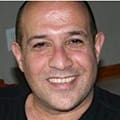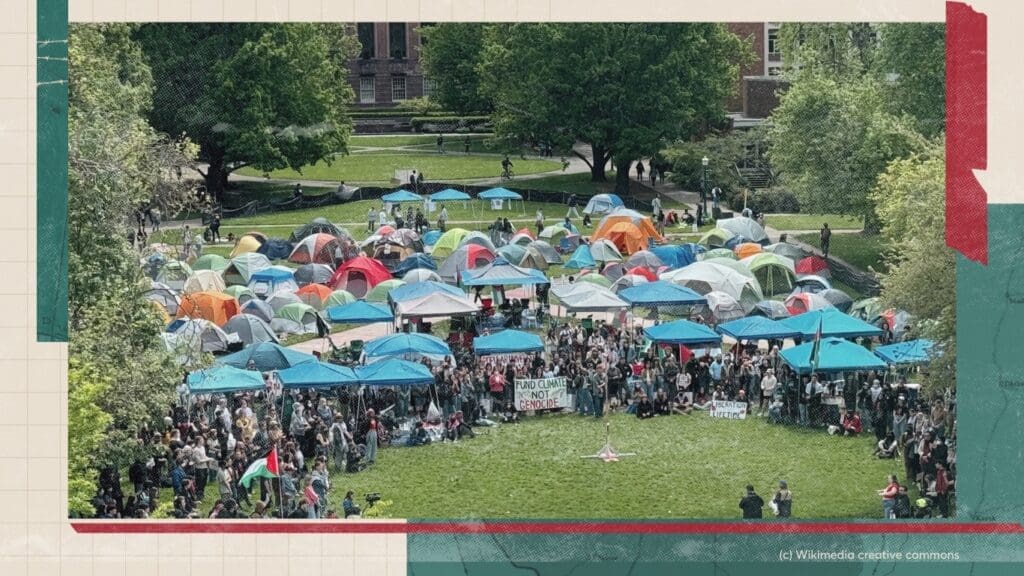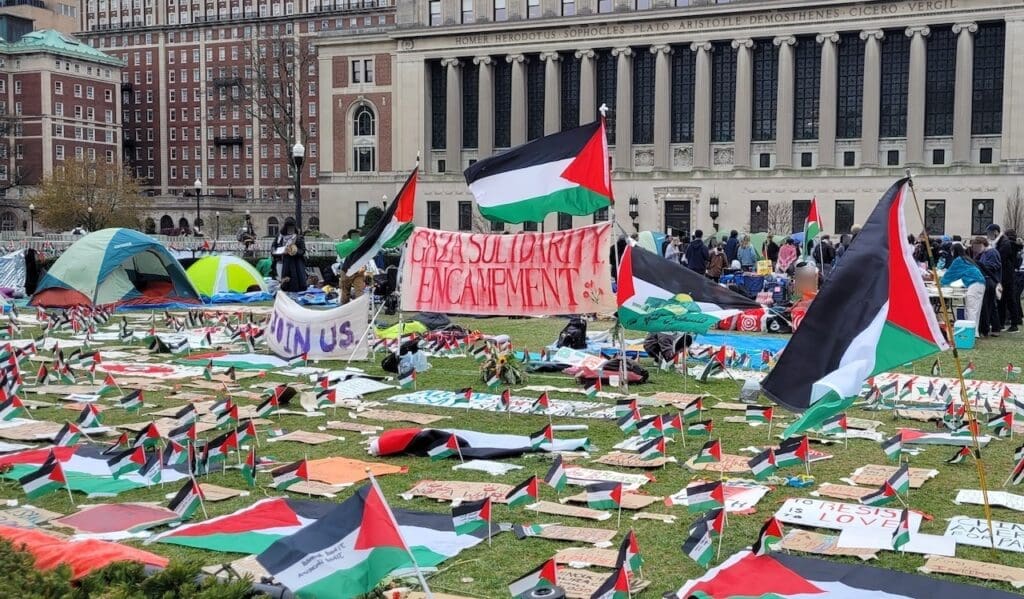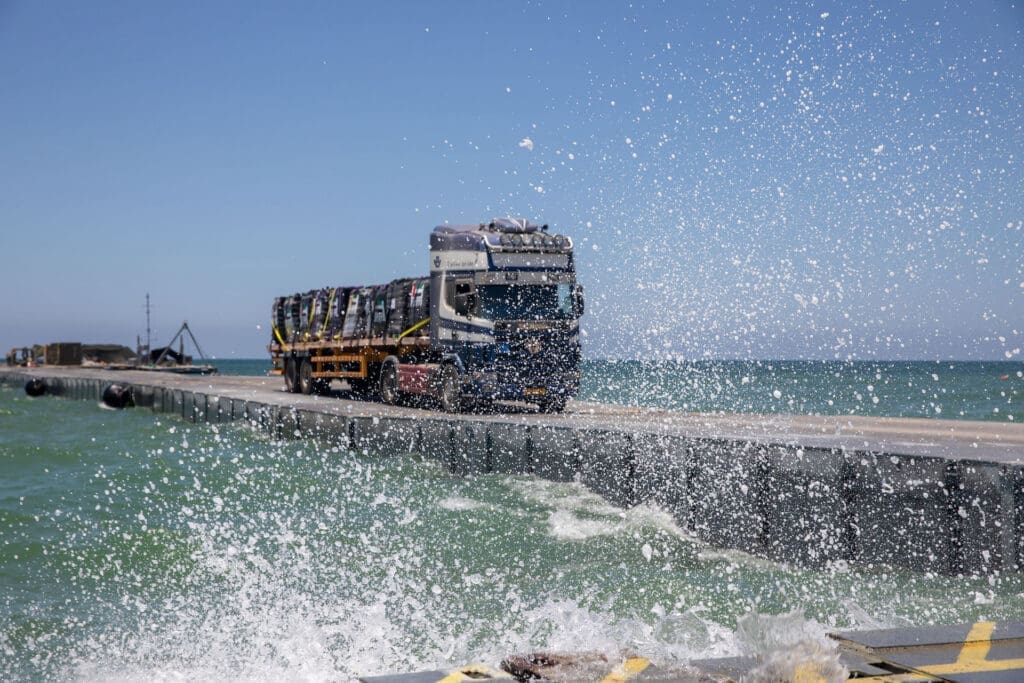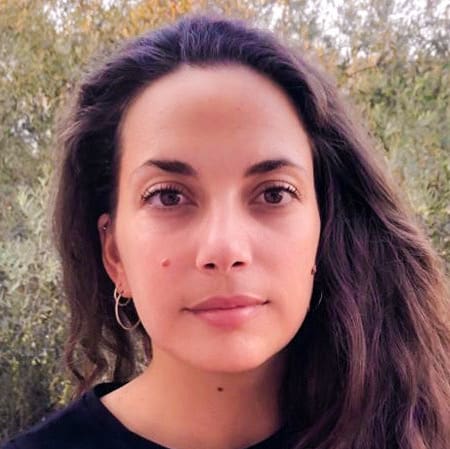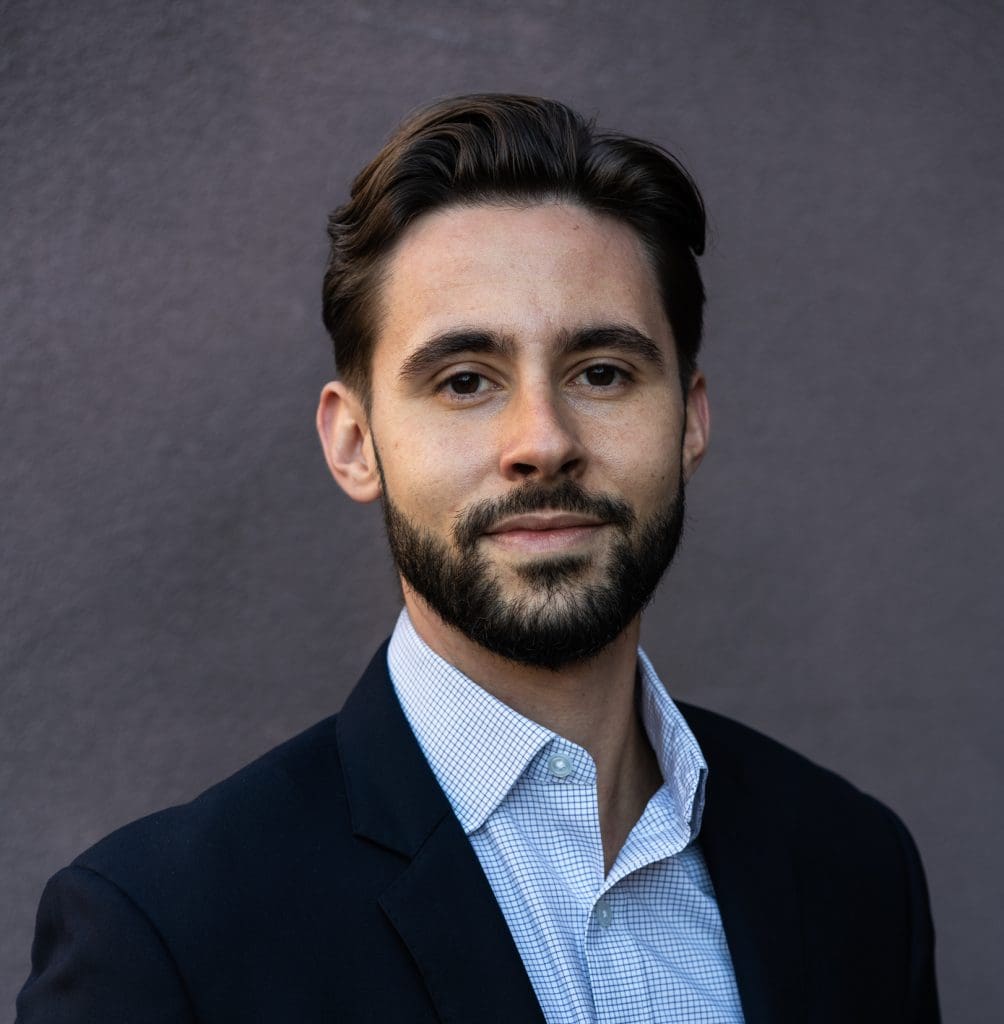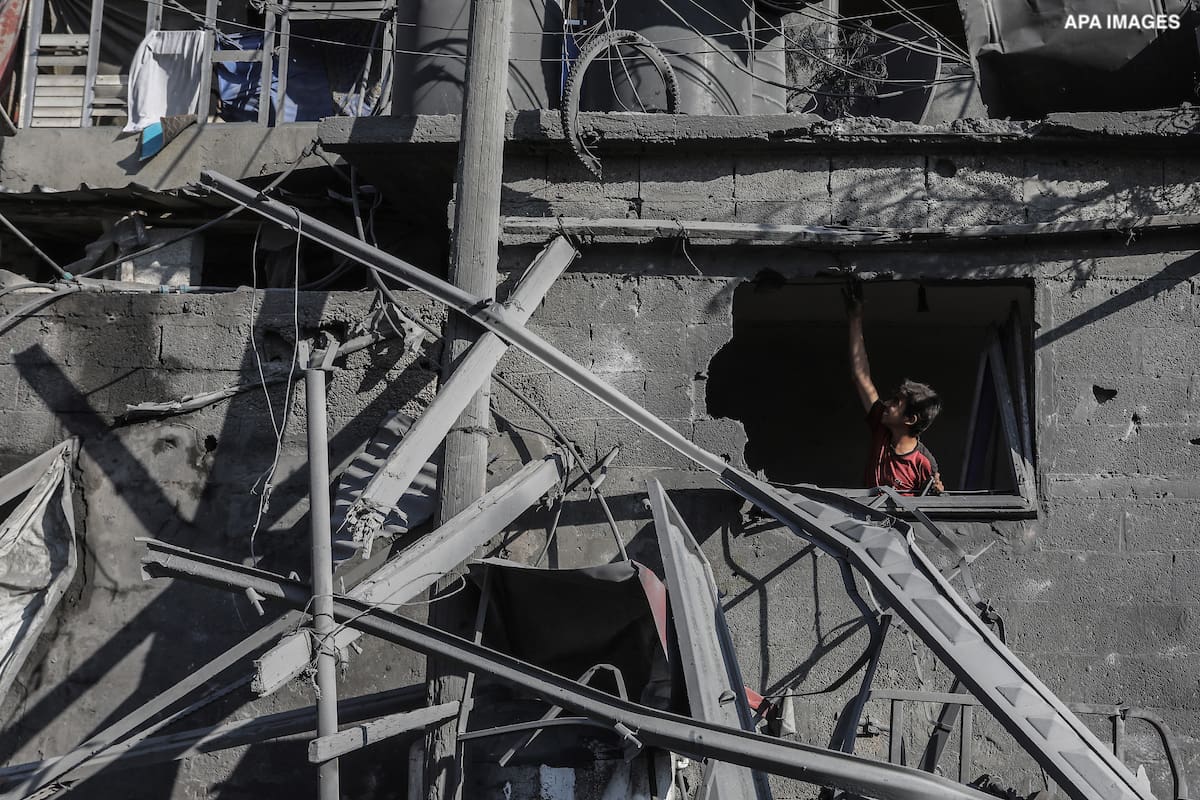
Introduction
The Israeli regime’s ongoing genocide in Gaza has caused widespread devastation across the besieged area. Heavy bombardment has killed thousands of Palestinians and displaced over one million; those that have survived thus far are largely without electricity or sufficient water and food supplies. Estimates are that nearly half of all of Gaza’s buildings have been damaged or destroyed. Palestinians have reaffirmed consistently that there is no safe place in Gaza, and that this current assault by the Israeli military is only the latest in over 75 years of attempted ethnic cleansing. 1
Such an effort likewise extends beyond the limits of Gaza. In the West Bank, more than 82 Palestinian households in Area C have been displaced since October 7th, and over 2,000 Palestinians have been arrested during this time. Armed Israeli settlers in the West Bank are distributing leaflets warning Palestinians of an impending greater Nakba, and over 130 Palestinians have been killed by Israeli settlers and soldiers.
None of this is going unnoticed. Across the world, Palestinians in the diaspora and those in solidarity with the struggle for liberation have been mobilizing, with hundreds of thousands protesting from London to Baghdad and beyond. Academics, students, trade unions, and many more have condemned Israel’s genocide of Palestinians, on some occasions at the cost of jobs, university placements, or organizational funding. The level of solidarity is unprecedented, and speaks to a shift in global consciousness increasingly opposed to the Israeli settler colonial project.
In this devastating yet critical moment, Al Shabaka’s Tariq Kenney-Shawa, Fathi Nimer, Yara Hawari, and Alaa Tartir weigh in on the unfolding situation since October 7th, 2023, and position it within the context of ongoing Israeli settler colonialism and Palestinian resistance.
The Violent Myth of “Unprovoked”
Tariq Kenney-Shawa
On October 7th, 2023, the Al-Qassam Brigades—Hamas’s armed wing—breached the seemingly impenetrable militarized barrier that has imprisoned Palestinians in Gaza for over 16 years. In a meticulously planned operation, the brigade overran Israeli defenses, ransacked military bases, and briefly controlled several Israeli settlements. Over 1,300 Israelis were killed during the attack, including both active-duty soldiers and civilians, and Palestinian fighters took over 200 hostages back to Gaza.
The Al-Aqsa Flood, as the operation is now known, was indeed unprecedented. To categorize it as “unprovoked,” however—a term swiftly adopted by Israel’s allies across the West and echoed throughout their mainstream media—reflects a deliberate attempt to obscure the violent conditions that rendered such a violent response inevitable.
Gaza is one of the most densely populated places on earth, and is often described as the world’s largest open-air prison. Home to over 2.2 million people, most of Gaza’s residents are refugees who were forced to flee their homes in 1948 by merciless Israeli militias. Israel took full control of Gaza in 1967, confining its inhabitants to a sliver of land increasingly isolated from the rest of Palestine and the world. In the face of relentless Palestinian resistance, Israel withdrew from Gaza in 2005, only to impose a suffocating blockade and siege that has continued ever since.
Today, a 23-year-old in Gaza has lived through six major Israeli military onslaughts and has witnessed over 14,000 members of their community killed by Israeli assaults Share on X
Palestinians in Gaza live under a state of constant provocation and abuse under Israeli blockade, following decades of colonial occupation that preceded it. Today, a 23-year-old in Gaza has lived through six major Israeli military onslaughts and has witnessed over 14,000 members of their community killed by Israeli assaults. The psychological impact has been devastating, especially among children, who make up nearly half of Gaza’s population. Nine out of 10 children in Gaza suffer from debilitating conflict-related trauma. Most have never left the territory due to strict controls imposed by both Israel and Egypt, which shares a southern border with Gaza.
In the first six months of 2023 alone, nearly 400 children in Gaza were denied permits to travel to the West Bank for critical healthcare, leaving many to die. Between 2007 and 2010, Israeli authorities maintained a calorie count of Palestinians’ nutritional requirements in Gaza to ensure that they would receive only the bare minimum to avoid starvation. Repeat Israeli assaults have devastated Gaza’s infrastructure, leaving residents with at most 13 hours of electricity a day. Meanwhile, nearly half of the population is unemployed, with the rate exceeding 70% among youth.
With no political recourse, Palestinians in Gaza are punished for daring to resist their imprisonment. During the Great March of Return in 2018, for example, Israeli forces killed 223 protesters and maimed thousands more as they demanded their right of return and an end to the blockade. The crushing response to the protests served as yet further evidence that the issue has never been the method of resistance, but rather the fact that Palestinians were daring to resist their oppression at all.
While the immediate triggers Hamas cited for its operation were Israel’s raids of Al-Aqsa Mosque and settler terrorism against Palestinians across the West Bank, the true provocations clearly run much deeper. The extent of the Al-Aqsa Flood operation came as a surprise to many, but it is a foreseeable response from a people who have known nothing but the horrors of ethnic cleansing, genocide, and Israeli settler colonial rule their entire lives. The truth bears repeating: Many Palestinians have come to grasp that the Israeli regime understands only the language of violence and force. So long as Palestinians live under a constant state of oppression and provocation, armed resistance will be inevitable.
The International Community’s Role in Palestinian Genocide
Fathi Nimer
For years, the Israeli regime and international donor community have utilized a “conflict management” approach toward Palestinians. This approach abandons the pretense of seeking a political resolution and focuses instead on maintaining “security” for the Israeli regime while “rewarding” Palestinians with limited economic incentives. The colonial occupation thus continues unabated; as long as Palestinians bear the brunt of the violence, the status quo is seen as sustainable.
Western states and multilateral bodies have drowned Palestinians in apolitical development aid that effectively subsidizes Israeli occupation and siege and relieves the Israeli regime of its obligations under international law. These bodies have likewise armed and trained the Palestinian Authority security apparatus, supporting it in brutally suppressing its own people in service of an indefinite status quo.
We cannot speak of the international community as merely complicit in Palestinian oppression, but rather as active participants in the Zionist colonization of Palestine Share on X
The West’s position has remained consistent regardless of Palestinian action or inaction. When Palestinians utilize nonviolent means, such as boycotts and marches, their efforts are nonetheless demonized, condemned, and ultimately ignored. Conversely, no matter how depraved the actions of the Israeli regime have been–from raining down white phosphorus on entire neighborhoods to burning Palestinian villages—it remains heavily rewarded and protected from any concrete repercussions.
Still, merely shielding the Israeli regime from consequence is not enough for the international community. Rather, it has sought to further entrench Israel’s settler colonial project in the region with a flurry of normalization treaties, spearheaded first by the US’s Trump administration and subsequently carried forth by the Biden administration. Notably, these treaties omit any commitment toward advancing Palestinian rights, let alone liberation. Many Arab states, including Morocco, the UAE, and Bahrain, have thus joined the West in abandoning the Palestinian struggle altogether for their own economic benefit.
Given these facts, we cannot speak of the international community as merely complicit in Palestinian oppression, but rather as active participants in the Zionist colonization of Palestine, including the genocide currently being committed in Gaza. The Israeli regime has been emboldened through decades of impunity to do as it pleases, knowing it will face no ramifications for the atrocities it commits. True enough, there has been no meaningful pushback to the ethnic cleansing of Gaza. On the contrary, there have been statements of solidarity from numerous nations affirming Israel’s right to cut off water and power to the besieged territory and massacre Palestinians freely.
Hamas’s Al-Aqsa Flood operation proved that the Palestinian struggle cannot be pacified through the Israeli regime’s failed approaches. It revealed to the rest of the world what so many Palestinians have long known: That foreign aid is not a replacement for liberation; that the status quo of occupation and apartheid is unsustainable; and that Palestinians will not die quietly while waiting for the world to remember their existence. Like all colonized peoples, Palestinians have the inherent right to break free from colonial chains and borders, regardless of the objections of an international order invested in their dispossession.
The West’s White Supremacist Allegiance to the Israeli Regime
Yara Hawari
This moment in the ongoing colonization of Palestine has filled many with horror and unfathomable grief. The Western response—the unyielding support for the Israeli regime, warmongering, and gleeful encouragement for the bombardment of Gaza—has only compounded these feelings with profound anger.
In one instance, UK Labour Party leader and former human rights lawyer, Keir Starmer, falsely claimed that the Israeli regime has the right to starve Palestinians in Gaza of water and power as a consequence of the Hamas operation on October 7th. In another, President of the European Commission Ursula von der Leyen stood alongside Israeli President Issac Herzog in a show of solidarity, declaring that “Israel has a right and duty to respond to Hamas’s act of war” while the Israeli army was bombing Palestinians fleeing northern Gaza. US President Joe Biden likewise pledged unwavering allegiance to the Israeli regime and even expedited shipments of munitions to assist in what is no less than a genocidal campaign against Palestinians in Gaza.
These global power players have only doubled down on their loyalty to the Israeli settler colonial project amid the brazenly dehumanizing and racially-coded discourse currently peddled by Israeli leadership. Defence Minister Yoav Gallant, for example, has referred to Palestinians as “human animals,” while other Israeli politicians and ministers are openly calling for ethnic cleansing. A video published on October 13th shows an Israeli war veteran, who participated in the 1948 Deir Yassin massacre, encouraging soldiers to “erase the memory” of Palestinians and their families. Ten days into the Israeli assault, Netanyahu’s X account described it as “a struggle between the children of light and the children of darkness, between humanity and the law of the jungle” (the post has since been deleted).
The conjuring of animalistic tropes and metaphors of light versus evil are deeply rooted in white supremacy, where at best Palestinians are creatures to be slaughtered and at worst sources of inherent wickedness. This rhetoric has largely gone unchallenged by Western leadership or their mainstream media outlets. Instead, it has been repeated by politicians as a justification for violations of international law. Even so-called allies insist on perpetuating harmful and racialized narratives that work to obscure the grave power disparities between colonizer and colonized, holding the value of Israeli life as far more precious than the lives of Palestinians. In all cases, white supremacy is at work.
The conjuring of animalistic tropes and metaphors of light versus evil are deeply rooted in white supremacy, where at best Palestinians are creatures to be slaughtered and at worst sources of inherent wickedness Share on X
It’s notable that there remain a few political figures in the West who have stood up against this dehumanizing discourse. Spain’s acting social rights minister, Ione Belarra, accused the Israeli regime of planning genocide and demanded for Netanyahu to be brought before the International Criminal Court for war crimes. UK Conservative MP Crispin Blunt has issued a notice of his intention to prosecute UK officials, including Starmer, for complicity in Israeli war crimes. Nonetheless, the limits of international law, which form the basis of these objections, have never been so clear—not only because of the lack of political will among the most powerful states to hold Israel accountable, but also because international law itself fails to confront the root cause of violence: Zionist settler colonialism.
Eventually, a ceasefire will be reached, bombs will stop raining on Gaza, the siege may be lifted, and Israeli war criminals may even be prosecuted. But Palestinians still won’t be free. For some of our allies this may be enough, but for Palestinians it won’t be. This terrible moment is thus also a pivotal one for the Palestinian liberation struggle: It necessitates an insistence that our struggle be understood not only as anti-colonial but as anti-racist. Palestinians must ground the struggle alongside other communities fighting against both settler colonialism and white supremacy, which collectively form the bedrock of many countries, ideologies, and international institutions alike.
Breaking Through Colonial Barriers
Alaa Tartir
Colonization confines indigenous and native peoples, not only spatially but also psychologically. Continuous colonial repression, subjugation, and attempts at erasure redirect the energies of those struggling for liberation to the immediate, and hinder the capacity to imagine possibilities for alternative futures.
The breaching of the Israeli colonial barrier that imprisons Gaza on October 7th was a decisive moment in the Palestinian struggle for liberation: It signified a colossal challenge to the power disparity between the Israeli regime, as colonizer, and Palestinians, as a colonized people. Moreover, it offered a glimpse into how maps and geographies may be redrawn in the process of a liberation struggle, and how the detrimental status quo might be transformed. Importantly, for a brief moment, it brought into the realm of possibility what was once unimaginable—namely, that the imposed borders of the Israeli regime, much like the regime itself, are both vulnerable and impermanent.
For over thirty years, the Israeli government, Palestinian Authority, and dominant foreign actors have determined the limits and boundaries for Palestinian possibilities and imaginations. They criminalized Palestinian resistance in all of its forms and simultaneously distracted Palestinians with peripheral issues, from an inflated bureaucracy to authoritarian governance. Many of these diversions originated from the 1993 Oslo Accords, which with coercive force imposed a framework that promised statehood but in reality denied Palestinians both their fundamental rights and collective liberation.
While the long-term outcomes of this moment remain unknown, it is abundantly clear that the deep-seated assumptions pertaining to the decades-long dominance of these parties has been rattled. That Palestinians may be kept and managed under siege and military occupation indefinitely is a notion no longer to be taken for granted. This upending of colonial dynamics is significant, not least due to the sense of hope it instills in Palestinians amidst our escalating pain and mounting suffering due to the atrocities carried out by the Israeli regime.
While unprecedented in many ways—including its violent consequences—it must also be understood that this moment does not exist in isolation. Rather, it is but the latest in a long thread of challenges to the colonial project over the past 75 years. In the last several years alone, one could point to the Unity Intifada, the Gilboa prison escape, the many prisoner hunger strikes, the Save Sheikh Jarrah campaign, and even the series of reports condemning Israeli apartheid as interconnected moments of resistance that inform our understanding of what it means to confront Israeli settler colonialism in all of its layers.
That Palestinians may be kept and managed under siege and military occupation indefinitely is a notion no longer to be taken for granted Share on X
Though critical debate surrounding the tactics used in some of these actions persists within the Palestinian community, each of them undoubtedly contributes to the expansion of the indigenous imaginary in relation to anti-colonial struggle. While the Israeli regime and its allies have worked to persistently shrink Palestinian borders and whittle away at the possibility for return, such resistance reminds us that all barriers—be they prison walls, state lines, or psychological limits—are malleable and, ultimately, destructible.
Of course, all of this is set against the backdrop of utter devastation in Gaza, where the Israeli army has slaughtered thousands and injured exponentially more. The scale of damage is unfathomable, and Palestinians—particularly those in Gaza—will have to grapple with the aftermath of the Israeli regime’s latest genocide campaign for years to come. As we work to reconstruct that which we’re able to, we must not lose sight of the power of such a paradigm shift. Rather, we must use it as an entry point for re-envisioning what the contours of a decolonial future may look like.
- To read this piece in French please click here. Al-Shabaka is grateful for the efforts by human rights advocates to translate its pieces, but is not responsible for any change in meaning.
